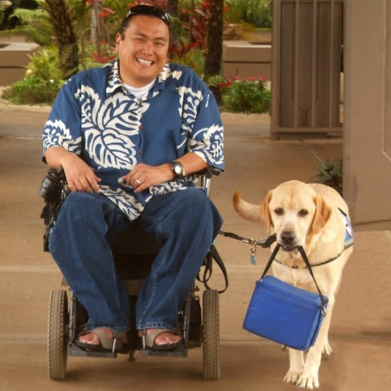 Service Animals
Service Animals
Are service dogs allowed on campus and in classrooms?
Yes. Service dogs are allowed on campus and in classrooms. When it is not obvious what service the dog provides, college officials may ask only two questions:
- Is the service dog required because of a disability?
- What work or task has the dog been trained to perform?
Expected Behaviors of a Service Animal
Control: A service animal must always be under the control of its handler. This typically means that the animal is harnessed, leashed, or tethered unless these devices interfere with the animal's work or the person's disability prevents using these devices. In such cases, the handler must maintain control of the animal through voice, signal, or other effective means.
Non-Disruptive: The animal must not engage in disruptive behaviors such as barking, growling, or jumping on people or engaging with other dogs unless the barking is part of the service the animal provides (e.g., alerting the handler to a seizure).
Focus: The service animal should be focused on its duties, not seeking attention from others, being distracted, or wandering off.
Public Interaction: The animal should not seek food or petting from others, should not sniff people or objects excessively, and must remain calm and quiet in various environments, including crowded or noisy places.
Response: The animal must respond promptly to the handler’s commands and should not require repeated commands to perform its tasks.
California Penal Code for Fraudulent Service Animals
California Penal Code Section 365.7:
This section of the California Penal Code makes it a misdemeanor to knowingly and fraudulently represent a dog as a service animal.
Penalties: Violating this code can result in a fine of up to $1,000, imprisonment in a county jail for up to six months, or both.
The law is designed to protect service animal designations' integrity and ensure that fraudulent claims do not undermine those who legitimately need service animals.
If any animal on campus with permission or not does not demonstrate the behaviors listed above may be asked to leave campus.
If you have the need for an Emotional Support Animal, you must register with the Disability Resources Department to receive the ESA as an accommodation.
Call (707) 527-4278 to make an appointment with your Specialist or to register with the DRD program
May a student be asked about the nature of their disability?
No. It is illegal to ask a person to disclose what their disability is or the reason they have a service dog.
Are animals other than dogs recognized as service animals?
No. Under the law only dogs (or in some instances, miniature horses) are recognized as service animals.
What is considered work or tasks that the dog performs?
The work or tasks performed by a service dog must be directly related to the disability. Examples of such work include:
- Guiding people who are blind
- Alerting people who are deaf
- Reminding a person to take prescribed medication
- Alerting and protecting a person who is having a seizure
- Pulling a wheelchair
- Alerting a person when blood glucose levels are low
The work or task must be active not passive. The crime deterrent effects of an animal's presence and the provision of emotional support, well‐being, comfort, or companionship do not constitute work or tasks. Such animals are deemed ‘Therapy Dogs’ and require an Authorized Academic Accommodation from DRD. Please refer the student to Disability Resources for further guidance.
What if another student or instructor is allergic or afraid of dogs?
Allergies and fear of dogs are not valid reasons for denying access or refusing service to people using service animals. It may be possible to accommodate by requesting students use different locations within the classroom or take a different section of the course.
Can the service dog be removed from the classroom?
A person with a disability cannot be asked to remove his service animal from the premises unless:
- the dog is behaving in a disruptive manner by barking, growling, whimpering, running around, or soliciting social attention through behavior or animal clothing uncharacteristic of a service animal; or
- the dog is not housebroken or clean; or
- the presence of the dog poses a direct threat to the health or safety of other persons that cannot be eliminated by a modification of policies, practices or procedures, or by the provision of auxiliary aids or services.
If any of the above 3 concerns exist, the service dog (not the student) may be removed from class. The student should be referred to DRD for further guidance. Faculty may contact DRD directly if support is needed.
The student is responsible for:
Having a current dog license, keeping the dog clean and pest free; in a harness or on a leash unless either the student is unable because of a disability to use a harness or leash, or the use of a harness or leash would interfere with the service animal’s performance of work or tasks; and any harm or injury caused by the animal to other students, staff, visitors, and/or property.